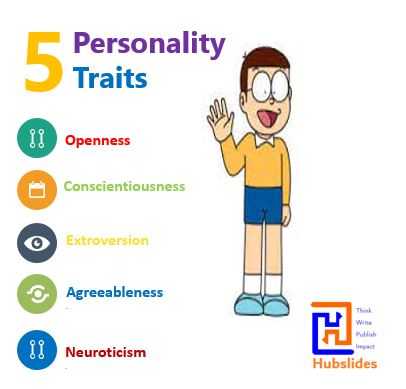Personality Traits And its Big 5 Models

Personality traits were also described as characteristics that distinguish one person from another.
Personality traits reflect a person's distinct characteristics, such as emotions, feelings, behavior, actions, and attitude.
Personality traits are mental sets that people acquire through being in certain situations, living or staying in the association of others, or through practice.
The Big Five Model's Beginnings
The Big Five, like other models that define human personality traits, is based on Francis Galton's lexical hypothesis, which first proposed in the 1800s.
According to the lexical hypothesis, every natural language contains all of the interpersonal descriptions that are important and relevant to the language's speakers.
What are Personality Traits and How Do They Affect You?
There are no two people alike. Because of their characteristics, two people will react and approach the same situation differently.
Some people are gregarious, while others are reclusive. Some people are energetic and active, while others are sluggish couch potatoes.
Each of the big five traits is part of a larger continuum. Introversion, for example, is the polar opposite of extraversion.
Extraversion and introversion are opposite ends of a continuum for the big five traits when combined.
People can be extremely extroverted or extremely introverted, but the majority of people fall somewhere in the middle.
It's also vital to know that each of the Big Five traits is very broad, encompassing a wide range of personality traits.
These traits are more precise and granular than the five traits taken together.
As a result, each characteristic can be defined broadly and further subdivided into several facets.
.jpg)
Personality traits big 5
An individual's behavior is thought to be made up of five broad traits, such as openness, trustworthiness, and conscientiousness.
Personality traits big 5 Model #1 - Openness
Openness to new ideas and experiences, also known as openness to experience, is a basic character trait that indicates receptivity to new ideas and experiences.
The five-factor model of personality, also known as the Big 5, is made up of five core personality traits that drive behavior.
People who are open to novelty are more willing to seek out a variety of experiences, to be comfortable with the unfamiliar, and to pay attention to their inner feelings than those who are not.
They have a strong desire to learn new things and enjoy being surprised.
People who have low levels of transparency prefer routines, people, and ideas that are familiar to them; they may be perceived as closed-minded.
Personality traits big 5 Model #2 - Conscientiousness
Conscientiousness is a basic personality trait (one of the Big Five) that reflects the strong desire to be accountable, organized, hardworking, goal-oriented, and follow rules and norms.
Conscientiousness encompasses self-control, industriousness, responsibility, and reliability, just like the other core personality factors.
.jpg)
Self-control and impulse control are skills that a conscientious person possesses.
This personality trait determines whether you should set and achieve long-term goals, deliberate over decisions, act cautiously or irrationally, and take your responsibilities to others seriously.
Extraversion, agreeableness, openness, and neuroticism are the other big five personality traits.
Conscientiousness is a critical component of success in both love and work. It is also a significant predictor of health, happiness, and longevity.
Personality traits big 5 Model #3 - Extroversion
Extroversion is a personality trait that is characterized by sociability, high energy, and/or talkativeness.
In general, the term describes a state of being in which one “recharges,” or draws energy from being around other people; introversion, on the other hand, is defined as drawing energy from being alone.

Many people already know where they fall on the introversion-extroversion spectrum based on a range of experiences and suggestions from others.
Others, on the other hand, may be unsure, especially since it's possible to be extroverted in some instances and introverted in others or to fall somewhere in the middle.
While online personality tests aren't perfect, they can help people figure out whether they're more of an extrovert or an introvert.
Personality traits big 5 Model #4 - Agreeableness
Cooperation, politeness, kindness, and friendliness are all personality traits that can be explained as agreeable.
People with a high level of agreeableness are often more trusting, affectionate, altruistic, and generally pro-social than others.
People with high levels of this pro-social trait are especially empathetic, demonstrating great concern for others' well-being and being the first to assist those in need.
The Big Five personality dimensions include agreeableness as one of them.
Personality traits big 5 Model #5 - Neuroticism
One of the Big 5 personality traits, neuroticism, is characterized by a proclivity for anxiety, depression, self-doubt, and other negative emotions.
Neuroticism, like all personality traits, exists on a scale-some people are often more neurotic than others.
Neuroticism is sometimes referred to as low emotional stability or negative emotionality in the context of the Big 5.
.jpg)
Although some self-deprecating comedians and complainers wear their neuroticism as a badge of honor, neurotic people are more prone to anxiety, mood disorders, and other negative social and emotional outcomes.
In the field of psychology, these five characteristics are described in the popular acronym "OCEAN."
References
Author Bio
The Editorial staff includes content researchers from various areas of knowledge. They add a plethora of expertise to the Hubslides Editorial team. They constantly and frequently oversee, produce and evaluate contents that are most ideal to aid impacting knowledge to readers.
Article Comments
No Comments!
At present there are zero comments on this article.
Why not be the first to make a comment?
Similar Articles
Sponsor
Search Articles
Experts Column
Latest Articles
Featured Articles
Most Popular Articles













